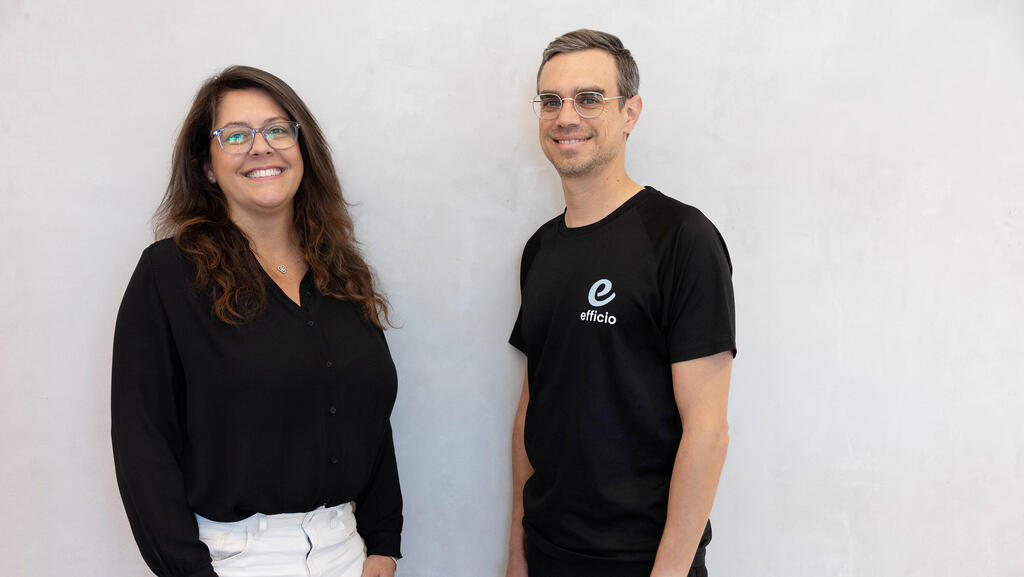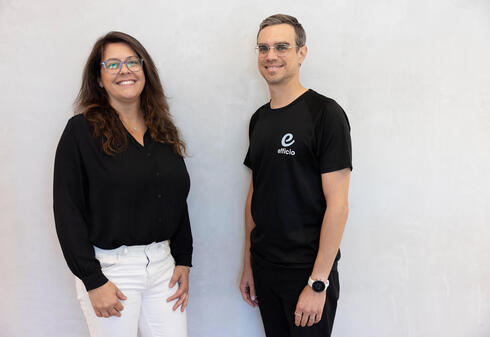
"We have a lot of success stories in Israel, and we need to learn how to leverage them"
As part of the Growth+ project by Calcalist and Poalim Tech, Lilac Bar David, co-founder and CEO of Lili, spoke with Dan Raveh, founder of Efficio, about the challenges in the journey to establishing a startup.
In a candid one-on-one conversation, Lilac Bar David, co-founder and CEO of U.S. neobank Lili, and Dan Raveh, founder of Israeli startup Efficio, opened up about the complex realities of building fintech ventures across continents—from navigating global crises to cracking American distribution channels. The discussion, part of Calcalist and Poalim Tech’s Growth+ initiative, offered a rare glimpse into the personal and strategic crossroads facing Israeli entrepreneurs scaling abroad.
Lilac, tell us about a challenge you experienced early on as an entrepreneur—and what you learned from it.
Bar David: "One of the biggest challenges came when we launched our product in the U.S. in January 2020—just one month before COVID-19 shut down New York. We were extremely anxious about what would happen to the small business segment. And indeed, the sector was hit hard. But at the same time, the U.S. government provided a range of incentives that helped many small businesses stay afloat and even grow.
"Initially we were pessimistic, but COVID brought two major changes: first, many people lost access to traditional financial services, which created a real opportunity for digital banking. Second, a wave of layoffs led many to start home-based businesses. There are constant ups and downs in building a startup. You have to keep adjusting your path as you go."
Dan, tell us about a recent challenge you’ve faced.
Raveh: "Our challenge is how to replicate our early success. We already have our first customers, but they’re mostly early adopters—people who know us or who are experiencing acute pain. Now we need to scale. We need to figure out how to sell to mainstream American banks, even though we’re all based in Israel and our market is across the ocean."
Lilac, what advice did you give Dan on that front?
Bar David: "We actually knew each other a little before this program, when Dan approached us as a potential client. We started talking about what interests banks, what success looks like, what kind of business model makes sense, and which internal processes are worth building. I advised him to consider distribution channels that give access to multiple banks at once. We discussed companies that offer fraud prevention and compliance services—Efficio could be a complementary product in that ecosystem. The idea is to make the sale more holistic.
"One of the big challenges for banks and banking platforms is that they work with many different tools, each requiring a separate integration. It’s costly and complicated. There's huge market potential for a company that can consolidate services. That’s what we do at Lili—we offer banking, accounting, and tax services in one place. We’re a kind of one-stop shop for small businesses."
What did you learn from each other?
Bar David: "I realized we face many of the same challenges—like managing global operations with a target audience in the U.S. but a team based in Israel. The Israeli tech ecosystem includes companies that address the same customer segments. Some of them could become clients or co-selling partners to financial institutions. We have a lot of success stories in Israel, and we need to learn how to leverage them."
Raveh: "Lilac helped me zoom out and see the big picture. We discussed one-to-many distribution strategies—something we had thought about, but hadn’t fully explored. She also gave me practical advice, like how to recruit Americans to join the team. That’s an ongoing challenge for us."
Related articles:
And what did you discover about each other—anything personal or unexpected?
Bar David: "We both fly to the U.S. constantly. We both have backgrounds in similar companies, and we both decided to leave the corporate path and build something of our own. That’s not a trivial decision—it reflects a deep desire to make an impact."
Raveh: "I was impressed by how Lilac identified a local market problem and turned it into a global opportunity. We live between two worlds—Israel and the U.S.—with families here and clients there. The challenge is always about connecting the dots."
